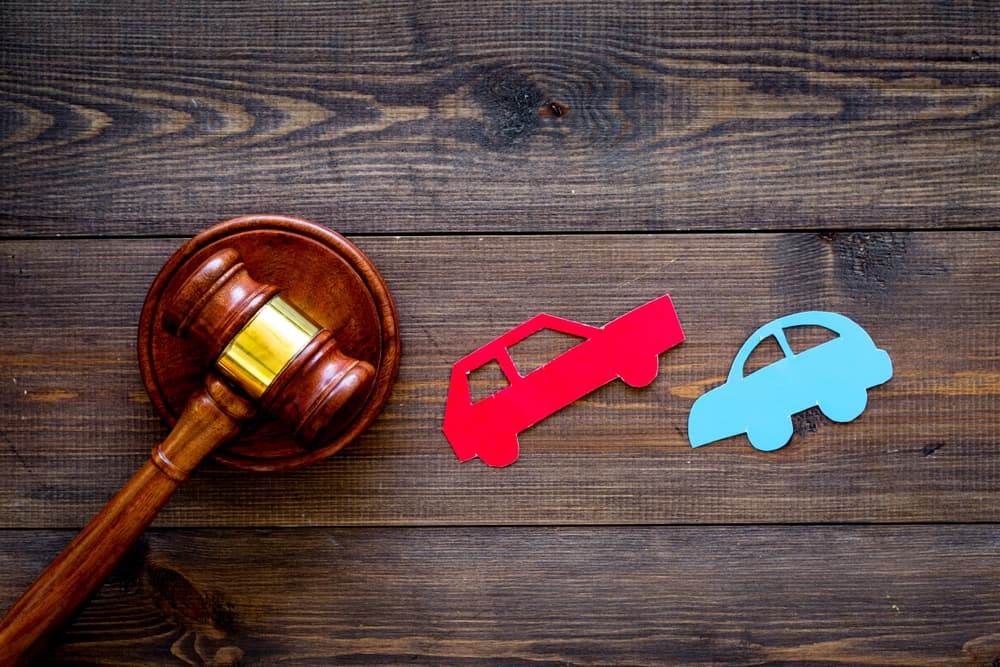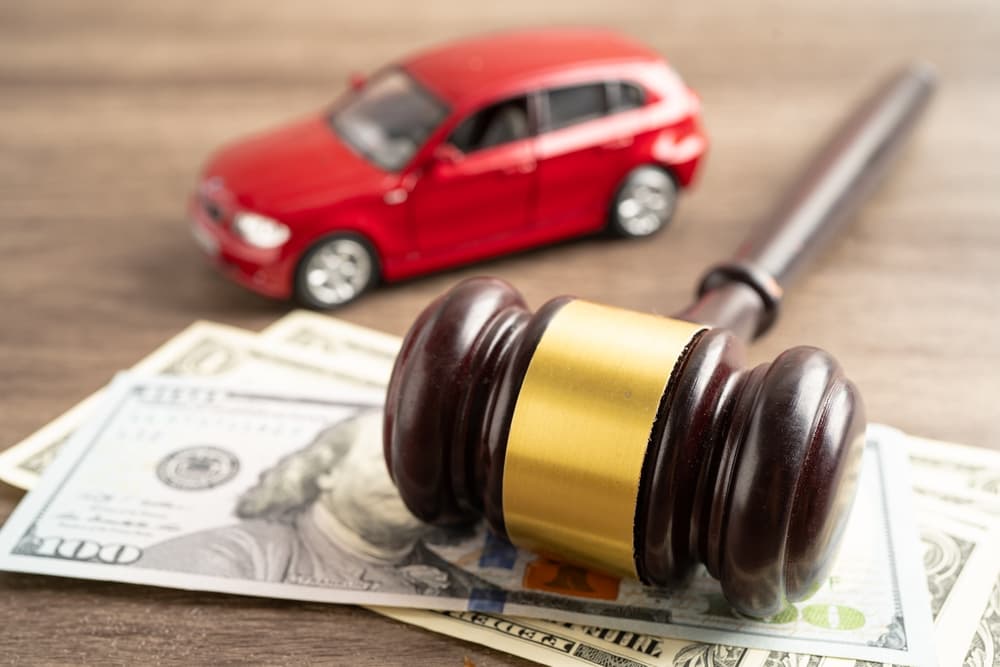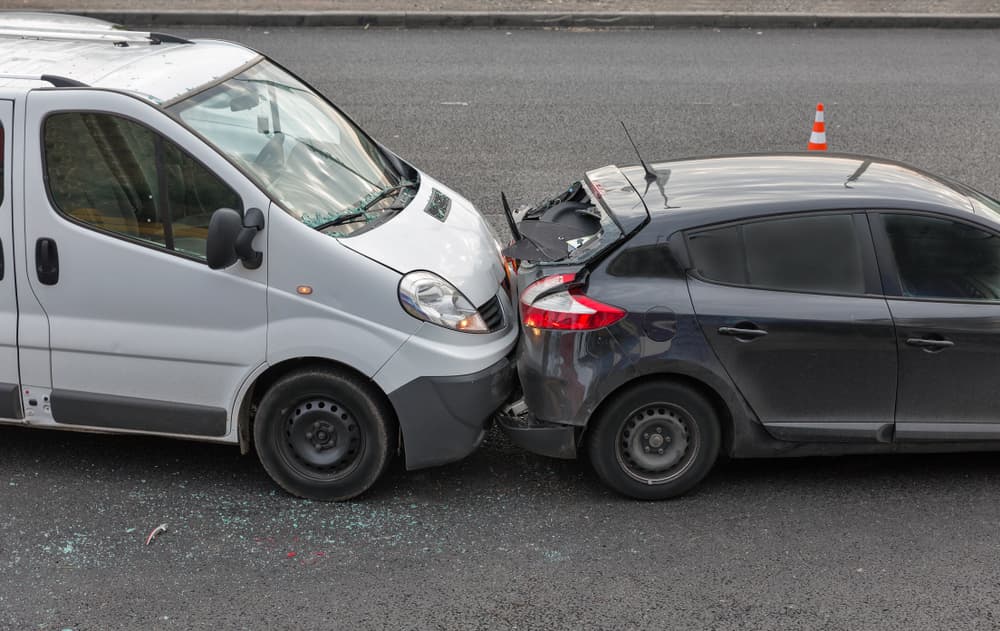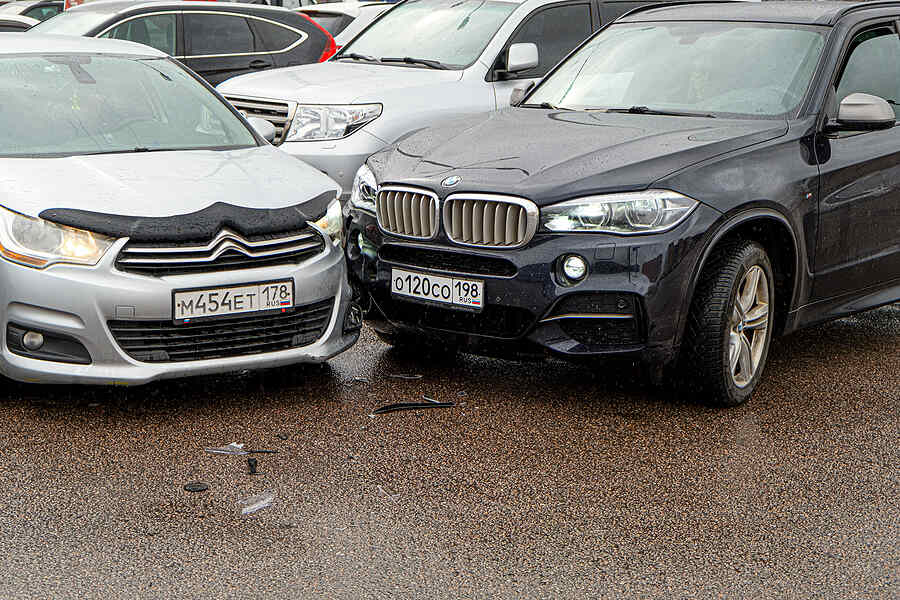You're driving down the road, minding your own business, when suddenly — BAM! — another vehicle slams into you. Suddenly and unexpectedly, your life is turned upside down. The accident injured you, totaled your car, and you're now dealing with a mounting pile of medical bills and lost wages.
The at-fault driver's insurance company is giving you the runaround, offering a lowball settlement that won't even cover a fraction of your losses. You know you need to take legal action to get the compensation you deserve, but you're worried about the cost and uncertainty of a lawsuit.
If this scenario sounds all too familiar, you're not alone. Millions of Americans are injured in car accidents each year, and many of them struggle to get fair compensation from insurance companies.
That's where filing a personal injury lawsuit comes in — it allows you to hold the at-fault party accountable and recover the full extent of your damages. But who actually pays if you win your case? The answer may surprise you.
In most cases, it's not the individual driver who pays out of pocket, but rather, their auto insurance company. And if their insurance isn't enough, there are other potential sources of recovery, such as your own insurance policy, third-party claims, and even government funds.
Understanding how compensation works in car accident lawsuits is crucial to ensuring you get the money you need to cover your medical bills, lost income, pain and suffering, and other losses.
If you or a loved one suffered injuries in a car accident, reach out to a skilled auto accident lawyer near you.
The At-Fault Party's Auto Insurance
In most car accident cases, the primary source of compensation will be the auto insurance policy of the driver who caused the crash. All drivers in Illinois must carry a minimum liability insurance policy in case they cause an accident resulting in property damage or bodily injuries to others.
If you file an insurance claim or lawsuit against an at-fault driver, their insurance company is responsible for providing compensation up to the limits of their policy. For example, if the driver has $100,000 in liability coverage for bodily injury and your medical bills, lost wages, and pain and suffering are determined to be $80,000, their insurance would cover that amount.
However, minimum liability coverage limits are relatively low in many states. In Illinois, drivers must only carry $25,000 per person and $50,000 per accident in bodily injury liability coverage. If your damages exceed those limits, the at-fault driver's insurance will only cover $25,000, and you'll have to look to other sources to recover the rest.
The At-Fault Party's Personal Assets

If the at-fault driver's auto insurance cannot fully compensate you, the next step is pursuing their personal assets.
However, this is often difficult or impossible because:
- Most people don't have significant assets beyond what's protected (primary home, retirement accounts, etc.)
- It can be difficult to identify what assets a person has
- You'd likely need to go back to court and get a judgment before you can go after their assets
- Even with a judgment, certain assets are off-limits or challenging to access
Therefore, while the at-fault party is technically liable for your damages, pursuing compensation beyond their insurance policy limits is often not feasible. This is one reason all drivers need adequate auto insurance - to protect themselves and to ensure accident victims can recover fair compensation.
Your Own Auto Insurance
Another potential source of compensation after a car accident is your own auto insurance policy. If you have certain optional types of coverage, you can file a claim with your own insurer to pay for some of your losses.
A few key types of coverage include:
- Collision coverage: This covers repairs to your vehicle if a crash damages it. If the other driver is at fault, your insurer will pay for your repairs and then seek reimbursement from the other driver's insurance company through a process called subrogation.
- Medical payments (MedPay) coverage: MedPay will reimburse you for reasonable and necessary medical expenses after a crash, regardless of who was at fault. This can provide immediate funds to pay for medical bills during your pending personal injury claim.
- Uninsured/Underinsured motorist (UM/UIM) coverage: If a driver who lacks insurance or sufficient insurance hits you, you can file a claim under your UM/UIM policy. This essentially compensates you as if the at-fault driver had proper insurance.
Your own auto insurance can be incredibly valuable after an accident, as it provides an additional source of recovery beyond the at-fault driver's policy limits. Purchase as much supplemental coverage as you can reasonably afford.
Other Third Parties
In some cases, a third party other than the at-fault driver may bear some liability for the accident.
A few examples include:
- Vehicle or parts manufacturers: If the crash was caused by a defect in one of the vehicles or its components (e.g. faulty brakes, airbag failure to deploy), you may have a product liability claim against the manufacturer. They would be responsible for compensating you for the harm their defective product caused.
- Government entities: If dangerous road conditions contributed to the accident, the government agency responsible for designing and maintaining the road may be liable. However, filing a claim against a government entity is subject to special rules and deadlines.
- Dram shops: Under Illinois law, a bar or restaurant that served alcohol to the at-fault driver may be liable for over-serving them past the point of obvious intoxication if the driver then caused a drunk driving accident. These dram shop laws aim to hold alcohol vendors partially accountable.
- Employers: If the at-fault driver was on the job during the accident, you can hold their employer liable. The employer's insurance policy would cover your damages.
These are just a few examples of potentially liable third parties. Identifying all sources of compensation is one important reason to work with an experienced car accident lawyer on your case. They can thoroughly investigate the accident to determine if any other parties may share blame.
Your Health Insurance
If you have health insurance, it will typically cover your medical bills after a car accident, minus any copays and deductibles. Your health insurance company will pay your providers and then seek reimbursement from any personal injury settlement or judgment you receive.
Your health insurance will not compensate you for lost wages, vehicle repairs, or pain and suffering. It only covers medical expenses. You'll still need to pursue an injury claim against the at-fault party and their insurance to recover your other accident-related losses.
Also, certain government health plans like Medicaid or Medicare cover you, they may seek reimbursement from your personal injury settlement or award. Your attorney can help you navigate this process and pay all valid liens from your recovery.
Workers' Compensation
If you were in a work-related car accident, meaning you were driving for your job during the crash, you could file a workers' compensation claim. Workers' comp covers your medical expenses and a portion of your lost wages while you cannot work.
Workers' compensation is a no-fault system, meaning you're entitled to benefits even if you caused the accident. However, if a third party was at fault, you can also file a personal injury claim against them in addition to your workers' comp claim. Your workers' comp insurer will seek reimbursement from your personal injury recovery.
Uninsured Motorist Fund
Illinois requires drivers to purchase uninsured motorists coverage of at least $25,000 per person and $50,000 per accident. Underinsured motorist coverage may be included in your policy for higher limits of uninsured motorist coverage.
If you are in an accident caused by an uninsured driver, your uninsured motorist coverage will cover the cost of injuries to you and your passengers. If you also have underinsured motorist coverage, it will cover injuries to you and your passengers if the cost exceeds the limits of the at-fault driver’s insurance policy.
Attorney Fees and Costs
When you work with a car accident lawyer on your case, you may wonder who pays their attorney fees. The good news is that most personal injury attorneys work on a contingency fee basis. They only get paid if they successfully recover your money through an insurance settlement or court award.
If your attorney successfully resolves your case, their fee will be a percentage of your recovery. The retainer agreement you sign when you hire the attorney should clearly outline the fee.
Your attorney may also incur certain case-related costs, such as court filing fees, expert witness fees, medical record costs, postage, and more while handling your claim. Typically, the lawyer covers these costs upfront then deducts them from your settlement or verdict before disbursing your funds. Make sure your retainer agreement specifies who pays which costs.
What Damages Are Available in a Car Accident Claim?

In a car accident claim, the injured party may recover several damages:
Medical Expenses
One primary damage in any car accident claim is compensation for medical expenses related to the injuries sustained in the crash.
This can include reimbursement for:
- Emergency room visits
- Hospitalizations
- Surgeries and other medical procedures
- Doctor's office visits
- Prescription medications
- Physical therapy and rehabilitation
- Medical equipment and devices (e.g., crutches, wheelchairs)
- Modifications to your home or vehicle to accommodate a disability
- Expenses for Travel to Medical Appointments
You can recover medical expenses already incurred and compensation for the estimated cost of future medical care made necessary by the accident.
Lost Wages and Reduced Earning Capacity
If your injuries kept you out of work or required you to work reduced hours, you can seek compensation for your lost income.
This includes:
- Wages, salary, commissions, or self-employment income you lost due to missing work
- Vacation days, sick leave, or personal time off you had to use during your recovery
- Bonuses, tips, or other compensation you didn't receive because of the accident
- Perks like health insurance, retirement contributions, and other benefits your employer normally provides
In addition, if your injuries result in a disability that impacts your future earning potential, you can recover compensation for your reduced earning capacity throughout your lifetime.
Pain and Suffering
You can also receive compensation for the physical pain and emotional anguish you experienced due to the accident and your injuries.
Some factors that influence the amount of pain and suffering damages include:
- The severity and permanence of your injuries
- The degree of physical pain associated with your injuries and treatment
- Limitations on activities you can no longer do or enjoy
- Emotional distress, anxiety, depression, PTSD, or other mental health impacts
- Disfigurement or scarring
- Reduced quality of life or loss of enjoyment of life
Calculating pain and suffering damages can be challenging, as there's no precise way to put a dollar value on these losses. Attorneys and insurance companies often use formulas based on your medical expenses and other factors.
Vehicle Repair or Replacement Costs
If your vehicle was damaged or totaled in the accident, you may recover compensation for repair costs or the fair market value of your vehicle if insurance declares it a total loss. You can also recover reasonable costs associated with the loss of use of your vehicle, such as rental car or public transportation expenses.
Out-of-Pocket Expenses
You can recover compensation for other reasonable and necessary out-of-pocket expenses you incurred due to the accident, such as:
- Costs of medical aids like bandages, crutches, or hot/cold packs
- Co-pays for doctor's visits and prescriptions
- Parking fees and tolls for traveling to medical appointments
- Cab fare, rideshare costs, or other transportation expenses
- Replacement services for household tasks you can't perform (e.g., childcare, lawn care, cleaning)
Loss of Consortium
If your injuries have negatively impacted your relationship with your spouse, they may be able to bring a claim for loss of consortium. These damages compensate for the loss of companionship, affection, help with household duties and other services spouses normally provide for each other.
Wrongful Death Damages
If your loved one was killed in a car accident caused by someone else's negligence, you may be able to bring a wrongful death claim. Wrongful death damages can include:
- Funeral and burial expenses
- Medical bills incurred before death
- Lost financial support and benefits the deceased would have provided to the family
- Loss of care, guidance, advice, and protection
- Loss of consortium
An experienced car accident lawyer can help you identify all the damages that may apply in your case and gather the necessary evidence to prove them.
Our Car Accident Lawyers Can Help You
As you can see, you can seek compensation from many sources after a car accident, depending on the specific circumstances of your crash. The at-fault driver's auto insurance policy is the primary source, but your own insurance, liable third parties, government funds, and other sources can also play a role. An experienced personal injury attorney can identify all possible avenues of recovery to maximize your compensation.
At Abels & Annes, P.C., we're dedicated to helping injured victims seek justice and the full compensation they need to move forward after a serious car accident. We offer free case evaluations, and we charge no attorney fees unless we win.
Contact us today at (312) 924-7575 or through our online form to discuss your rights and legal options after a crash.



